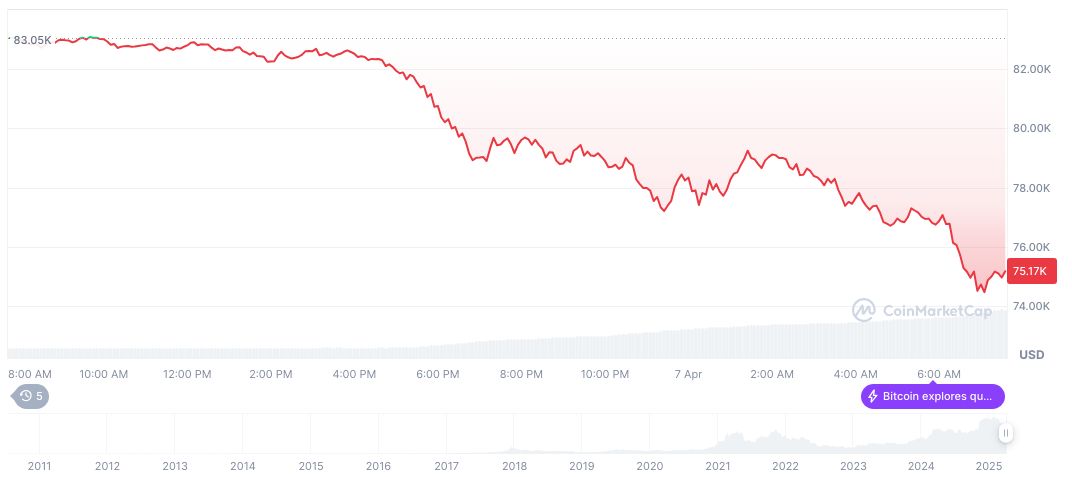- Main event, leadership changes, market impact, financial shifts, or expert insights.
- Bitcoin falls below $74,700 amid trade tensions.
- Potential long-term rebound anticipated by experts.
Bitcoin experienced a sharp decline of over 10% on April 7, 2025, amid ongoing U.S. trade tensions, dropping just below $74,700.
Escalating tariff disputes have triggered significant volatility across global financial markets, impacting cryptocurrencies and eroding substantial market capital. Yale research on economic impact of U.S. tariffs provides further insight into these economic effects.
Bitcoin Drops Below $74,700 in 24-Hour Slide
Trade tensions linked to U.S. policy have triggered a sharp decline in Bitcoin’s price. Falling over 10% in 24 hours, it reached levels below $74,700, reflecting broad market apprehensions about ongoing tariff disputes. According to Geoff Kendrick, head of digital asset research at Standard Chartered, Bitcoin is positioned as a hedge against these pressures.
Market turmoil extended across other cryptocurrencies, with Ethereum down over 14% and Solana dropping 15%. Liquidations across the sector soared, erasing nearly $1 billion in value. Analysts anticipate further declines as geopolitical uncertainties persist, with Trump declaring a national emergency to bolster competitiveness exacerbating market fears.
Geoff Kendrick, Head of Digital Asset Research, Standard Chartered Bank, said, “Bitcoin will become a hedging tool for tariff risks in this round of trade wars. The U.S. isolationist policy increases the risk of holding fiat currency, which will ultimately benefit Bitcoin.”
Experts like Jim Cramer of CNBC describe the situation as a “man-made devastating crash.” His remarks align with sentiments that the crypto market’s plunge draws parallels with historical shocks, notably the 1987 “Black Monday”. Immediate reactions indicate fears of continued volatility in the days ahead.
Potential Long-Term Rebound for Bitcoin Amid Volatility
Did you know? Bitcoin’s recent price patterns resemble the pre-market behavior witnessed during famous financial crises like Black Monday 1987, highlighting the cryptocurrency’s intertwined relationship with macroeconomic tensions.
Bitcoin (BTC) trades at $76,286.18, with a market cap of formatNumber(1514116355042.08, 2). The cryptocurrency experienced significant declines, posting a 24-hour drop of 8.10% and a 60-day fall of 22.75%, according to CoinMarketCap.

Coincu research team highlights Bitcoin’s historic resilience amid economic volatility. Given current geopolitical tensions, the cryptocurrency’s traditional hedge attributes may support a cautious recovery. Analysts foresee strategic shifts in regulatory approaches as markets seek stability in the face of tariff-induced fluctuations.























